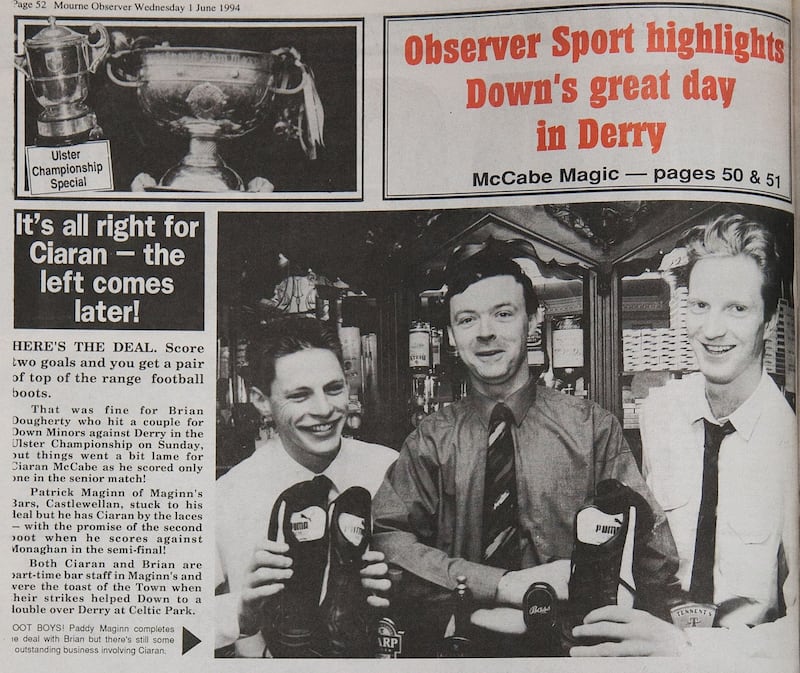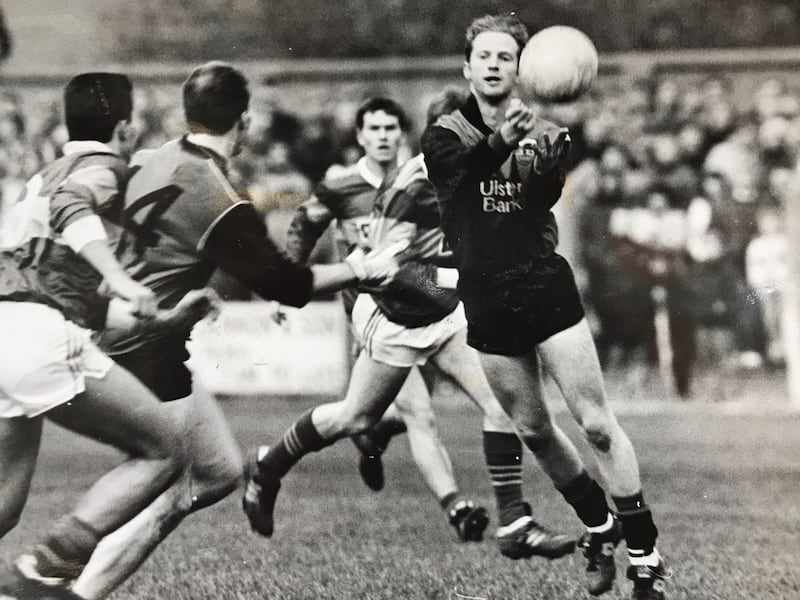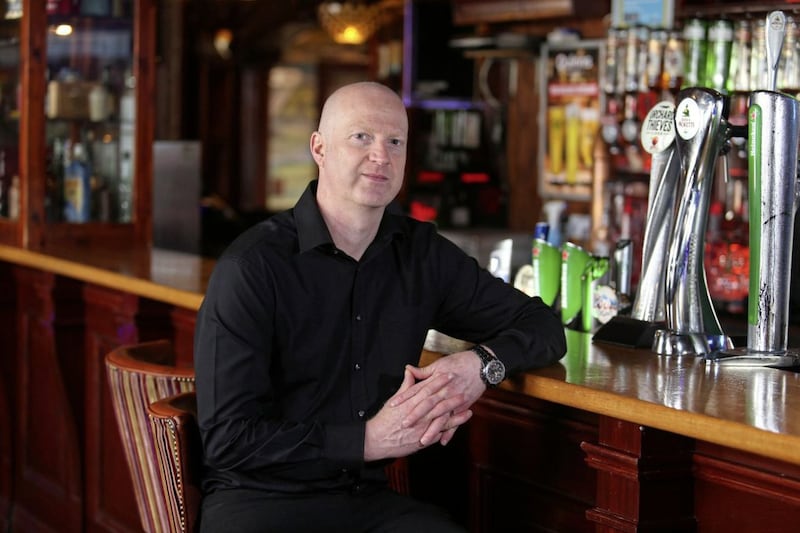PADDY Maginn was never one to miss an opportunity, and little has changed over the course of a quarter of a century.
For this tale you have to go back to the days before Down’s 1994 date with Derry, when sections of the Mourne support found themselves gripped by an uncharacteristic sense of foreboding.
Back then, the eve of Championship was when the famous Down hauteur - viewed with eye-rolling despair beyond its borders and wilfully encouraged within - would usually reach peak strut.
Yet, as May 29 and the prospect of going into the lion’s den crept ever closer, storm clouds were gathering.
Eamonn Coleman’s side weren’t reigning Ulster and All-Ireland champions for nothing – they were a ferocious outfit, a potent mix of silk and Sperrin steel. They also had the run on their Ulster rivals.
In 1992 it was Derry who knocked Down off their perch, crushing dreams of defending Sam while simultaneously cementing their own.
On the way to reaching the promised land 12 months later, they inflicted on the Mournemen a beating so bad, so humiliating in front their own supporters that it came to merit its own moniker – thus ‘the massacre at the Marshes’ was born.
Working in the pub trade and listening to sob stories from the other side of the bar, Paddy Maginn had become a sound judge of public mood. Egos had been bruised and pride hurt, he could tell, but Paddy still believed.
He also had a vested interest. Two young staff members at his family’s Castlewellan pub were hoping to play a part at Celtic Park that Sunday – Brian Dougherty with the minors and, on the senior panel, a lanky, free-scoring forward with a mop of shaggy blonde hair called Ciaran McCabe.
So Paddy offered them an incentive - score two goals and I’ll buy you a pair of Puma King boots. Dougherty duly obliged, bagging both majors in a 2-10 to 0-9 win. McCabe, meanwhile, found the net just once.
That it was the crucial goal in the closing stages of arguably the greatest game Ulster has ever seen, and one of the single most important strikes of a ball in Down’s storied history mattered for nothing when he clocked back in at work days later.
After all, a deal was a deal.
On the back page of that week’s Mourne Observer, Paddy was pictured standing between a beaming Dougherty, proudly displaying his two brand spanking new boots, and McCabe, rather awkwardly holding one.
‘It’s all right for Ciaran,’ read the headline, ‘the left comes later!’
“That was classic Paddy,” says McCabe, “anything for a bit of free publicity.”
Nowadays he is bar manager at the popular Quinn’s on Newcastle’s Main Street - still working for Paddy Maginn, and still the man who scored that goal.
A framed print-out of that back page, as well as the inside spread hailing McCabe’s heroics, hangs on a wall in the bar. It’s got to the point where he doesn’t even notice it any more.
After his goal the whole summer opened out in front of Down, while Paddy Maginn’s offer extended for the entirety of a campaign that would end with red and black flags fluttering around Croke Park on the third Sunday in September.
Ulster and All-Ireland champion and a showreel strike preserved in time? Not bad going for a 23-year-old in his first year with the big boys. McCabe nods in agreement.
For him though, that tells only a part of the story.

****************
THE winter months had been spent stewing. For seasoned vets like DJ Kane, Ross Carr, Greg Blaney et al, the manner of their Championship exit the previous May still churned the stomach.
Pete McGrath was cute enough to dial into that hurt, memories of the Marshes pushing his men through the pain of that familiar climb up to the Cloughmore Stone that looks down on Kilbroney forest park.
It was a shock to the system for some of the new boys on the panel, and McCabe was no different.
“Pete actually got athletic coaches in to train us at one point; I think they lasted two or three sessions before he chased them because they weren’t pushing us hard enough.
“It was tough, but it was good. It mightn’t have felt great at the time but it was all part of bringing the group together.”
The intensified Derry rivalry was baggage McCabe didn’t carry having only been brought into the panel before Christmas, but he couldn’t have missed the smouldering desire to settle scores.
“I was still quite green to it all; I never even thought about them being All-Ireland champions, about that defeat in the Marshes.
“But you could see what it meant to the older ones.”
The hatches were battened down further as the big day neared when the GAA decreed that the Mournemen couldn’t wear jerseys bearing Ulster Bank branding as the Championship was sponsored by Bank of Ireland.
A small grievance in the grand scheme of things, turned into more fuel for an already raging inferno.
McCabe remembers little of the bus pulling into the Derry city, or of weaving through the throngs bound for Celtic Park. The colour, the crackling atmosphere even, it all faded into the background as he sat on the sidelines watching the drama unfold, praying for a chance to come on and make a difference.
“I don’t know what other subs feel like, but I was just dying to get on to the field. That’s what you trained for – you didn’t train to sit and watch.
“There was only three subs then, and Paul Higgins had already come off the bench in the first half. That was one gone. Ross went off injured in the second half, Peter Withnell came on for him, that was two gone.
“So you’re sort of counting it down and it’s not looking too good…”
And then there was the mind of the man wearing the bainisteoir’s bib to consider.
Pete McGrath had been his manager at minor and U21 level too and, although he had brought him into the senior set-up, McCabe was never convinced he had McGrath’s full confidence.
“I remember playing a minor match in Rostrevor and he took me off after 10 minutes - he told me he didn’t think it was going to happen for me.
“I walked off the pitch, lifted my bag, went and sat in the car and said ‘I’ll never kick a ball for that man again’. You can’t do that on somebody. Ten minutes?
“It was hard to take at the time, but then you really want to play, don’t you?”
So he came back.
Fast forward then to the National League clash between Down and Derry on February 6, 1994 – the dress rehearsal for their much-anticipated Ulster Championship showdown.
McCabe started, but was hooked 15 minutes in.
“He must’ve had a crystal ball because it was just the same thing again – ‘I didn’t think it was going to happen for you today’.”
Months later, with the clock ticking down at a sun-drenched Celtic Park, McGrath had only one roll of the dice left.
When an Anthony Tohill point put Derry two up with 11 minutes to play, he signalled for McCabe to get ready, issuing one simple instruction.
“Go and get a goal”
In his first couple of minutes on the field, McCabe found himself lost in the midst of the madness, but he was right there where it mattered when the game-defining - possibly even Championship-defining - moment arrived.
And when it did, 64 minutes in, it wasn’t just the Derry defence who were caught on the hop by the relative unknown with the golden touch.
“Greg Blaney gets it, hounded by Diamond,” buzzed commentator Jimmy Smyth excitedly as the Down playmaker looked up towards the square.
“That’s a good ball… Linden the target man...
The chance… the shot… IT’S IN THE NET!
It’s brilliantly finished by Aidan Farrell...
The substitute it is… Peter Withnell is it?”
After a pregnant pause, co-commentator and former Fermanagh star Peter McGinnity stepped in to save the day.
“Ciaran McCabe,” he declared, “is the man.”
Ciaran McCabe was the man alright, bursting through to collect Linden’s lay-off before rifling home high and handsome into Damien McCusker’s net; the instinctive windmill celebration that followed the defining image of an unforgettable day.
“You wouldn’t have wished for any other player to have the ball at that time, and he had a habit of going high to the net,” says Miceal Magill, who played corner-back for Down that day.
“Ciaran was the quiet man, but an absolute assassin in front of goal.”
“When you see the whites of the goalie’s eyes, you go for goal,” adds McCabe.
“I got the kind of chance you pray for in a match – those are the chances you want. When you get that chance, you have to score and I always felt that if I got a chance on goal, I’d score it.
“That’s what I tell kids now - if I see you fisting the ball over the bar when you’re one-on-one with the goalie, I’ll throttle you! I don’t care if you miss, just go for it. Take a risk. It’s okay.”
After such a stunning cameo appearance, McCabe was handed his first Championship start against Monaghan the next day out.
That Ulster semi-final took place on June 19 but football was the furthest thing from the minds of both sets of players as they ran out at an eerie Athletic Grounds that sombre Sunday afternoon.
Less than 24 hours earlier, a gang of loyalist gunmen had burst into the Heights bar in Loughinisland and killed six innocent men in cold blood as they watched the Republic of Ireland’s World Cup win over Italy.
Five others were injured in the bloodbath, including a relative of McCabe’s who had been working in the bar.
“Pete did ask before did I want to play. It was just a strange environment, and I suppose for that to be your first Championship start… but I would never use that as an excuse.”
The reality was that, from a purely physical point of view, McCabe was nowhere near his best after picking up a foot injury in training.
It was only in the week leading into the Monaghan game that he was able to play a full part in the sessions. He failed to pick up where he left off at Celtic Park, eventually withdrawn from the action after 53 minutes as Down eased across the line.
“I knew because of what happened in Derry that I’d probably start, but I hadn’t done the training, I just wasn’t as sharp… I missed a goal chance too that day which I should’ve had. I just scuffed it.
“Maybe it was just everything on the day, I don’t know, but I’d say it was the lack of training that probably affected me more than anything. There’s being fit, and there’s match fit and if you’re missing that wee bit of sharpness, it shows.”
Dropped for the Ulster final win over Tyrone, Pete McGrath used just one substitute in each of the three games that followed Monaghan as the Mournemen swept to another All-Ireland title.
And after walking from the field in Armagh Ciaran McCabe – the Down darling three weeks earlier – didn’t touch leather again all summer, his Championship amounting to the sum total of 63 minutes over two games.
“I probably knew then my goose was cooked,” he says of his withdrawal against the Farneymen.
“Gary Mason wasn’t there for the Derry game so when Ross got injured, he came in for Ross, then Ross came back for the Ulster final. Once everybody was back and training and everybody was fit, I sort of knew.
“But we won the Ulster final handy enough, I thought there was a chance to get a run out there. We beat Cork easy enough in the semi-final but Pete never made any changes.
“You can reward boys who’ve put the effort in. Even if it wasn’t me, somebody else... but that's just the way it went. At the end of the day, it was Pete's call - he had to do it his way, and it worked out.
“Maybe I just wanted everything to happen straight away.”
****************

“In the future, everyone will be world famous for 15 minutes”
Andy Warhol
WHEN it came, the end was swift, and brutal. Just a year after an electrifying 2-3 had put Tyrone to the sword in the 1999 Ulster semi-final, Ciaran McCabe was part of the Down side sent tumbling out of the exit door by Antrim.
A clear-out was to be expected, and McCabe soon discovered – albeit inadvertently – that he was one of the casualties.
“I went to Castlewellan training one night and I noticed big Mickey McVeigh, our goalkeeper, wasn’t there. So I said to his brother ‘where’s your fella tonight?’
“He’s at county training, he says, and I said ‘well that must be me then’. That’s how I found out, as sure as God as I’m sitting here now. Not even so much as a phonecall.
“I didn’t expect any fanfare, I know I wasn’t a big name or anything. It just would’ve been nice to be told.”
It was a county career that promised so much but, by McCabe’s own admission, never quite reached the heights it could and maybe should have.
His emergence came at the right time in one sense, scoring the goal that proved a lightning rod for an extraordinary All-Ireland winning campaign. But it also coincided with the beginning of the end for so many of the men who had helped deliver Down to that stage.
Coming off the bench and rippling the Derry net was a feeling unlike any other he has experienced, before or since, but it came at a price.
The ‘super-sub’ tag, the enigma. The maverick.
“Oh aye, McCabe the super-sub… or sub just,” he laughs.
“Maybe I had that way of playing or whatever, maybe it was my body language, I don’t know. I was fast but I was always waiting for a chance to come.
“I remember being told that I didn’t run enough, but you don’t have to run 50 kilometres a match to score a goal. It might be 20 yards when the chance comes up. You could run all day and achieve nothing.
“You always feel you could’ve done more. I didn’t help myself at times, there were a couple of times I walked away; times where I just felt I was getting nowhere.
“Looking back now, that goal [against Derry] could’ve either been my Andy Warhol moment or a ball and chain around my neck...”
So, 25 years on, which was it?
“A bit of both probably,” says McCabe with a wry smile.
“Ach, look, it was brilliant, of course. There’s some great memories there, some great days along the way.
“But I’ve still a box with only one boot in it.”


